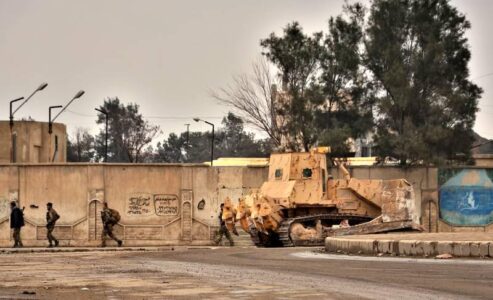
Islamic State prison camps unsustainable as Syria terror threat grows
Keeping 10,000 ISIS detainees in prison camps in north-east Syria is not sustainable as the terrorist group tries to regain strength in the region, the US warned on Thursday.
An ISIS prison break in January in Hassakeh, Syria, was a “perfect example of the risk” posed by the many foreign fighters being kept in the region, US deputy counter-terrorism chief Chris Landsberg said.
There were talks on Wednesday in Morocco between dozens of countries in a global anti-ISIS coalition, stressing growing concerns about the threat of the group in Africa.
But ISIS retains a presence in Iraq and Syria despite the loss of its territory three years ago. The group was described by France as “disturbingly resilient” after ministers discussed its threat in those countries.
“While the group has been considerably weakened there, it remains a threat and is still carrying out terrorist attacks at a concerning rate,” Mr Landberg said.
He said the January attack in Hassakeh, in which many fighters from the US-backed Syrian Democratic Forces were killed, was “a wake-up call and a reminder of their intent to reconstitute in the region”.
Mr Landberg said about 10,000 fighters and 60,000 relatives were living in camps in that region, despite attempts to repatriate them.
He said one problem was that a “significant portion” of the foreign fighters came from Russia and China, and that the US was not willing to work with those countries to repatriate citizens because it feared they will suffer inhumane treatment.
“It’s an unsustainable situation in Hassakeh and we’re very concerned about it,” Mr Landberg said. “The January attack was a perfect example of the risk.”
The US announced at the talks that it would seek to counter radicalisation in Syria by waiving sanctions to allow investment in parts of the country not controlled by President Bashar Al Assad’s regime.
This is to help communities liberated from ISIS to control and stop the extremists “exploiting local grievances” to win support, Mr Landberg said.
A separate summit on Syria heard this week that 90 per cent of Syrians in their home country were living in poverty and more than half struggling to feed themselves after 11 years of conflict.
That conference in Brussels ended with countries committing about $6.7 billion to support humanitarian assistance in Syria.
But western powers said they would not pay for the country’s reconstruction until there were signs of progress in political dialogue.
“The resurgence in past months of [ISIS] attacks in the north-east of Syria and elsewhere requires continuous collective efforts to counter these worrying developments,” a final statement from the donor conference said.
Sources: The National





